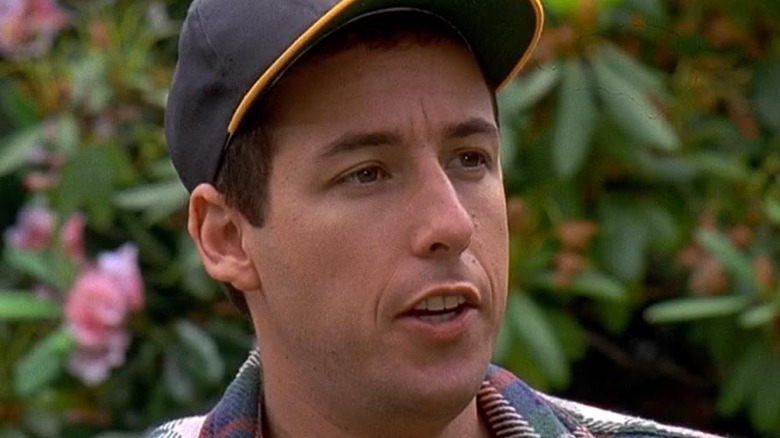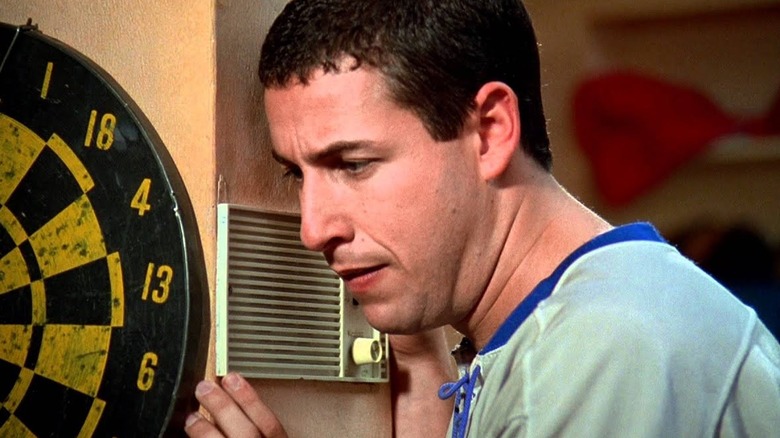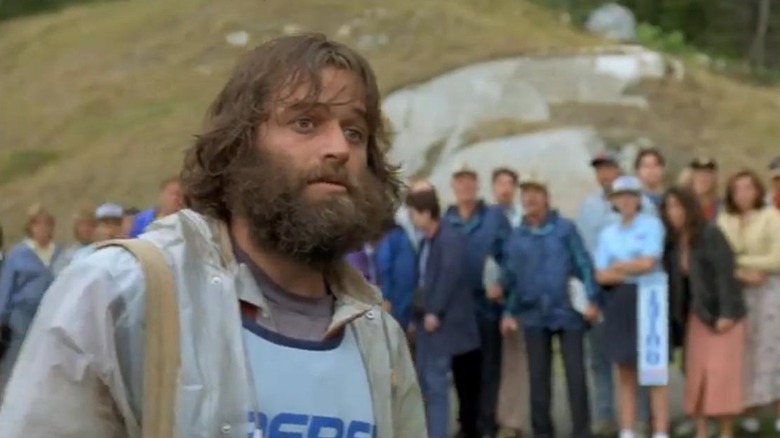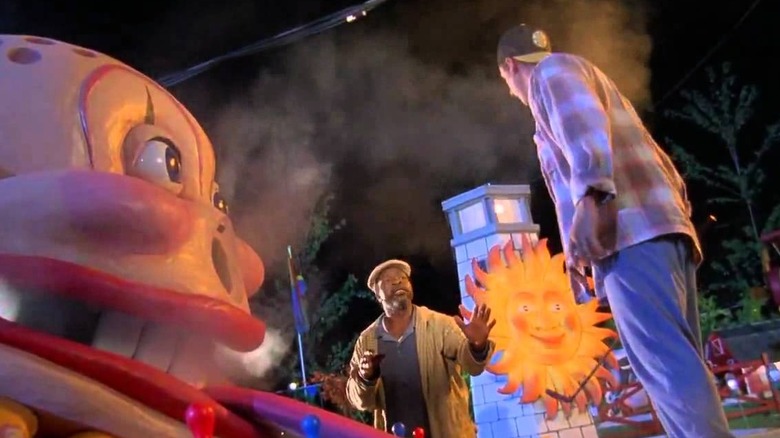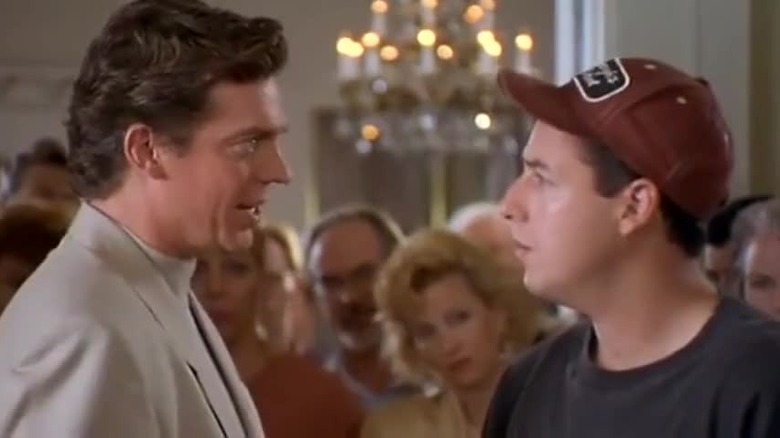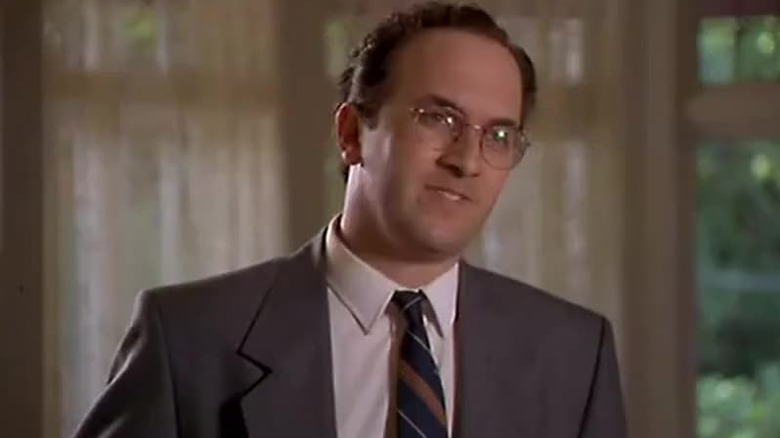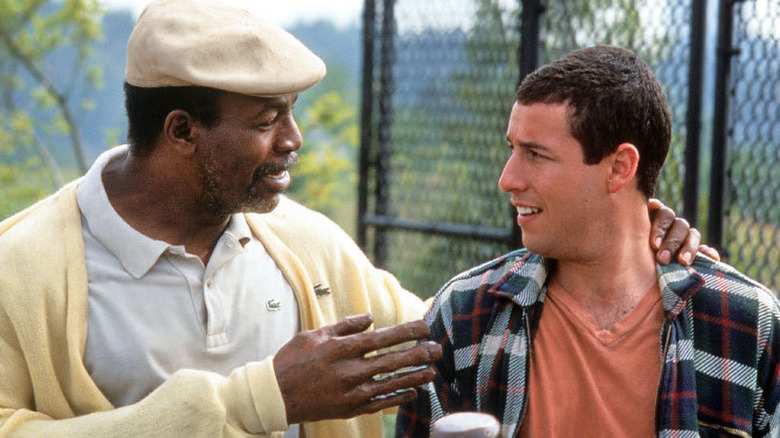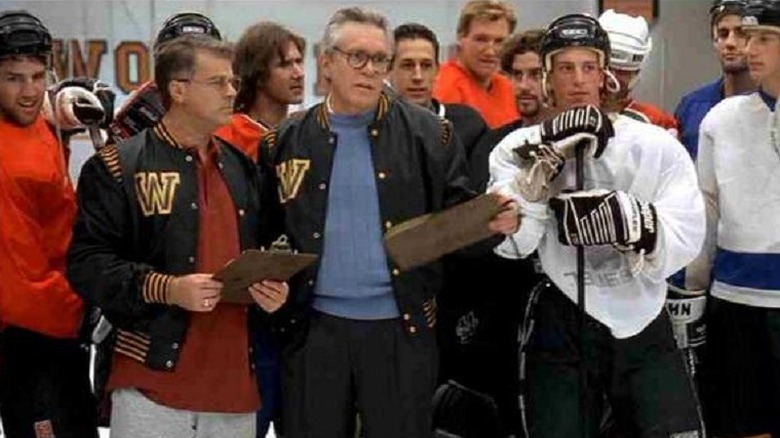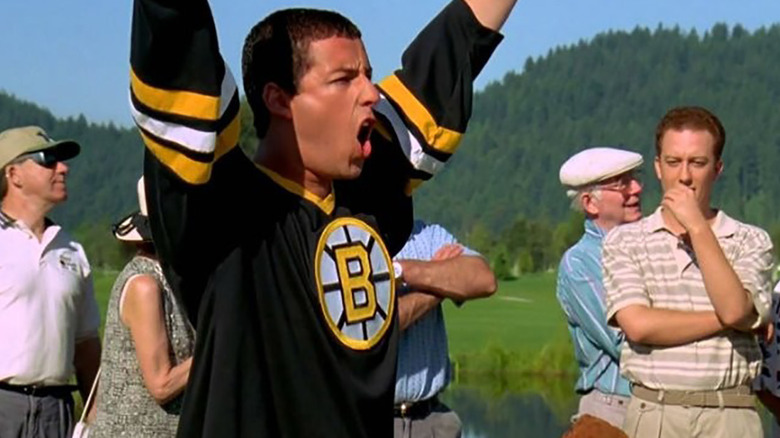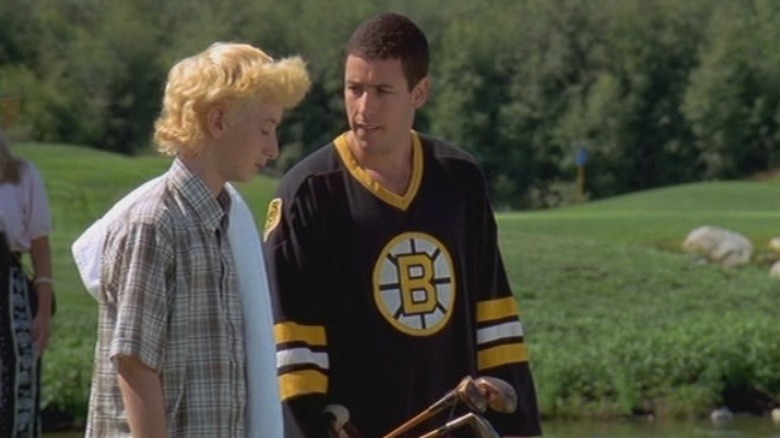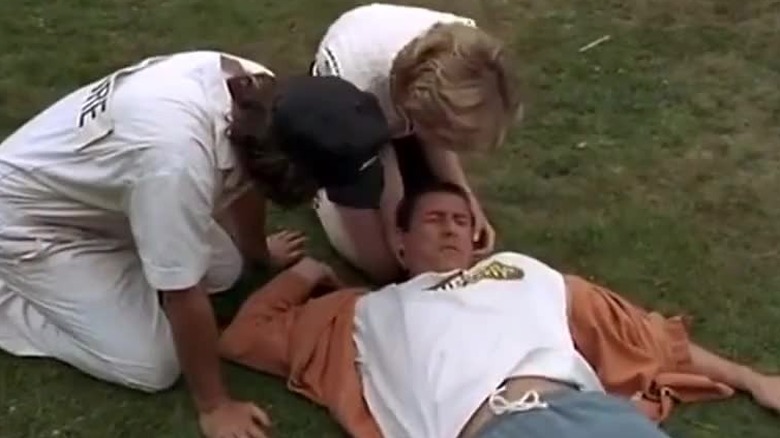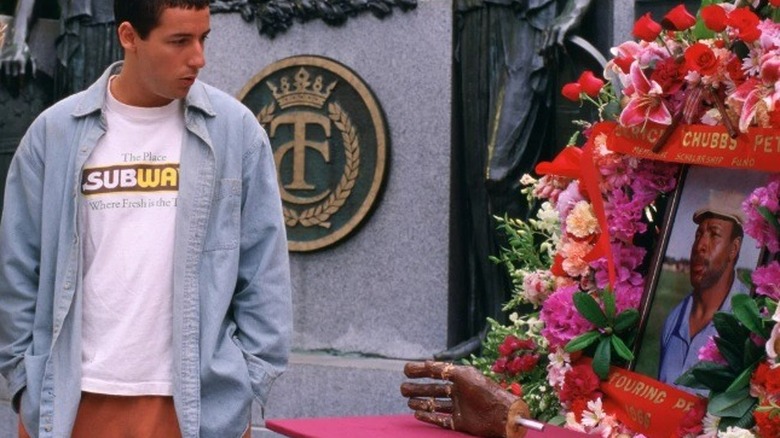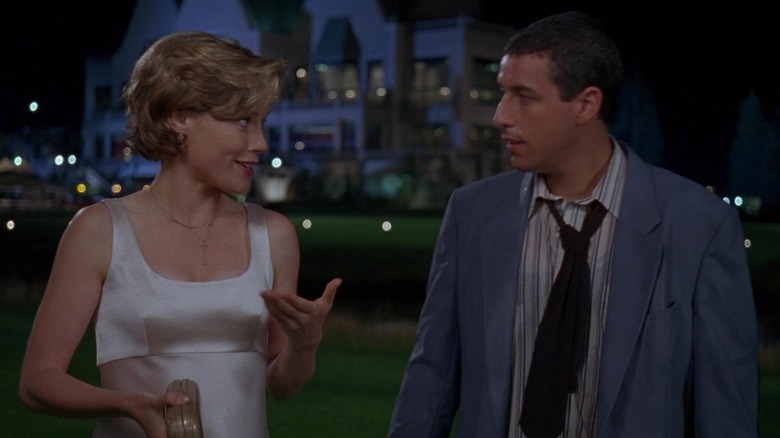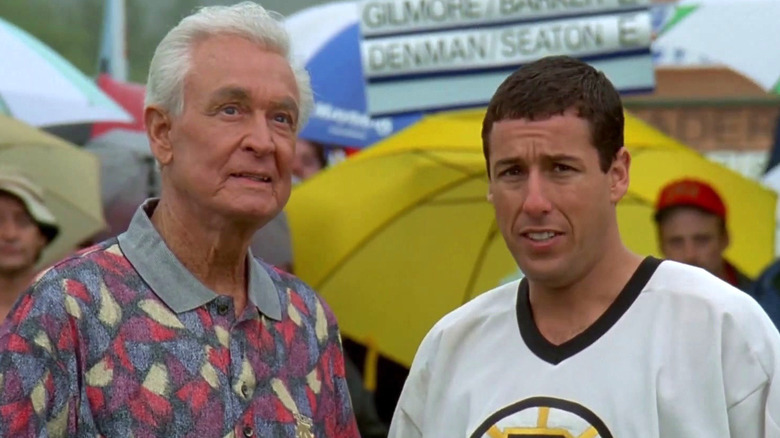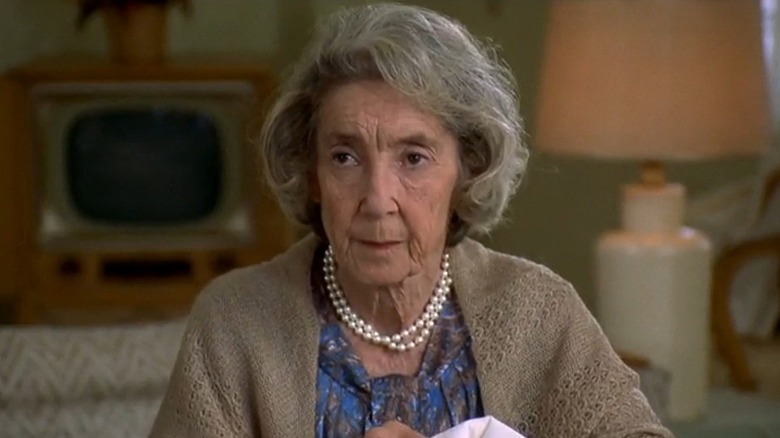Happy's 7 Best And 7 Worst Scenes In Happy Gilmore Ranked
There's a reason why Adam Sandler named his production company "Happy Madison" — it's a portmanteau of the two movies that put him on the map as a movie star and remain two of his most beloved. While "Billy Madison" leaned heavily into Sandler's man-child persona, "Happy Gilmore" sees him play a character who's at least a little more mature and a bit further along in life — even if much of his behavior could still be classified as childish. But Happy gets himself together and starts to do the right thing much more quickly than Billy did his own, even if Happy makes a few major missteps along the way.
This list is not about the overall best and worst scenes in "Happy Gilmore." Rather, we're looking at the scenes that represent the character as a person, including those that don't show him in the best light. There's no denying that some of the scenes of Happy at his worst are also some of the funniest scenes in the film — including a fistfight with a certain game show host — but that doesn't mean that these moments don't speak poorly of him as a human being.
Worst: Yelling at his girlfriend over the intercom
A common trope of Adam Sandler films, especially his earlier ones, is to establish that he's down on his luck and that we're picking up from a time in his life where everything is falling apart for him. In "Happy Gilmore," the titular character is seen blowing his hockey tryouts — just the latest of many, the movie implies — and then hopes to go home to a loving girlfriend who will cheer him up. Instead, he arrives to find her on her way out, permanently.
Happy then runs to the intercom in his apartment to try and reason with his now-ex girlfriend, and though he starts off sweet, he quickly flips to yelling at her and insulting her skills as a teacher. He regrets this and tries to flip back to sweet again, only to return to screaming. Though he does eventually end up attempting to serenade her with Exile's classic love song "Kiss You All Over," she's already long gone, and the damage has been done. This scene really speaks to Happy's inability to regulate his temper, and how quick he is turn mean and cruel at the first sign of negativity from another person.
Best: Making the homeless man his caddy
While Happy might be prone to flying off the handle and he definitely should've abandoned his dream of playing pro hockey years ago, the movie also does make sure to showcase that he's a good person with a big heart. Besides all he does for his grandma, there is also a moment fairly early in the film where Happy has a sweet encounter with a homeless man (played by longtime Sandler friend and collaborator Allen Covert) at one of the golf tournaments. The man comes up and cleans the windshield on Happy's car, which Happy thanks him for — but the man is then whisked away by security, and Happy verbally expresses his disappointment about it.
Shortly after, when Happy discovers that he was supposed to provide his own caddy for this tour, he goes out and finds the man and makes him his caddy — a job the man holds for the remainder of the movie. It's a kind gesture that really speaks to Happy's willingness to help someone out in their time of need, even a total stranger.
Worst: Destroying the mini golf course
Happy spends large portions of "Happy Gilmore" throwing violent temper tantrums, but most of them are only physically taken out on his own clubs — that is, when he's not attacking people, which we'll get to later. If he wants to wreck his own 9-iron, that's on him. But it's when Chubbs Peterson (Carl Weathers) is trying to help him get better at putting by taking him to a miniature golf course that Happy engages in some unfortunate destruction of property that does not belong to him.
At several points, Happy misses a putt and immediately turns to his trademark move of channeling his anger through his club. Only this time, he takes to breaking various elements of the mini golf course. Like the antics of many Sandler characters, it's something he probably should've been arrested for, but of course he faces absolutely no consequences whatsoever. And sure, it can be argued that the clown that spit his ball back out and laughed maniacally after doing so deserved to have his nose lopped off with a putter, but it still represents Happy's extreme temper issues — and now the owners of that course are going to have to fork over some serious cash for repairs.
Best: Trying to fit in with the pros
Happy is a hockey player at heart and seems to hate the game of golf, only playing it out of necessity because it's the quickest way to earn the cash needed to save his grandma's house from foreclosure. He spends the first half or so of the movie insulting the sport, its fans, and even some of its players, not bothering to hide his disdain for being forced into the world of fairways and sand traps.
Still, when Happy joins the pro tour and first meets his fellow pros at a banquet, he decides to be mature about it and interact with the men in a friendly way. He could've easily shown up with a chip on his shoulder, especially being the talk of the sport at the time for his incredible driving abilities, but he instead comes in humble and willing to try his best to fit in. Unfortunately, Shooter McGavin (Christopher McDonald) spoils that when he pranks Happy with the "9th green at 9" hazing ritual, but no one can say Happy didn't come in with the right attitude.
Worst: Throwing the IRS agent through the glass door
Adam Sandler has always been generous about giving friends and former colleagues parts in his films, and this extends to some of the writers from during his tenure at "Saturday Night Live." Robert Smigel, perhaps best known for "TV Funhouse" as well as being the voice of Triumph the Insult Comic Dog, has made appearances in multiple Sandler films. He was the overly earnest chemistry teacher in "Billy Madison," and in "Happy Gilmore," he's the reluctant bearer of the bad news about the tax woes of Happy's grandma.
Smigel plays the man as someone who actually does feel about the job that he has to do, and makes that clear several times throughout his scene. He even seems especially concerned that Happy doesn't dislike him for having to be the person to kick grandma out of her house. While it's definitely a funny moment when Happy reassuring the man that he doesn't hate him leads to a quick cut to the man crashing through the glass on the front door and rolling down the stairs, it's an unnecessarily cruel (and violent) thing for Happy to do to this guy who's not only simply doing his job, but has shown an unusually high amount of compassion and empathy as he did so.
Best: Befriending Chubbs
Initially, Happy's plan to make money simply involves hustling people at a golf range by betting them to see if they could out-drive him. This gets him noticed by Chubbs Peterson, a retired pro golfer who approaches Happy and offers to take him under his wing. Happy initially declines, until Chubbs points out how much more money he could make by actually playing golf. From that point on, Chubbs takes on Happy as his mentee, teaching him the ins and outs of the sport.
At first, Happy obviously accepts Chubbs' help purely out of necessity, wanting to be better at golf just to make as much cash as possible. But Happy also quickly grows fond of Chubbs, and the two become friends as time goes on. Once Happy starts to gain more notoriety and rise through the ranks of the sport, it's arguable how much he still "needs" Chubbs as a coach, especialy as he could probably have his pick of coaches and retired pros who'd be been willing to latch onto the hot new golfer. But Happy stays loyal to his friend, and keeps him along for the ride for literally the rest of Chubbs' life.
Worst: Beating up the guy (and everyone else) at the hockey tryouts
It's debatable whether Happy continually showing up to hockey tryouts time after time is a sign of determination or indicative of a guy who doesn't know when to bow out gracefully. Either way, he keeps trying out and keeps giving his all, for what the movie says is close to a dozen times at that point. The two men presiding over the tryouts seem pretty down on Happy, only willing to concede that he has an incredibly powerful slapshot.
When it comes time to announce who will be advancing, Happy's name isn't called. Happy wants to double check just to make sure there hasn't been a mistake, and at this point, he's still being very humble and earnest. The guy running the tryouts then gets Happy's hopes up only to squash them as a way of mocking him, resulting in pretty much everyone on the ice laughing at him. It's a cruel thing to do, no doubt, but Happy responding by not only punching the guy but then attacking everyone who tries to break up the fight doesn't do him any favors in proving he has the professionalism or temperament for pro-level play.
Best: Learning to have fun but still be professional on the course
A publicist named Virginia Venit (Julie Bowen in one of her very first film roles) is tasked with keeping an eye on Happy, helping to cultivate his youthful energy while also trying to temper his more extreme behaviors. It's often a losing battle for her, at least initially, as Happy remains quick to fly off the handle and begin cursing, throwing his clubs, and even attacking spectators whenever a round isn't going his way. When Virginia tells him to cool all that off, Happy assumes she means that he isn't allowed to have fun anymore. She assures him that his being fun is exactly why people love him so much, he just needs to also calm his temper.
As the pro tour progresses, Happy eventually starts to strike that balance, still showcasing his ability to liven up the often dull sport of golf while remaining professional as he does so. In fact, he begins to get so good at it that Shooter McGavin has no choice but to pay someone to heckle him and try to draw the temper back out, which ends up resulting in Happy's worst moment in the film (more on that later).
Worst: Attacking and berating his young caddy
Happy knows next to nothing about golf when he first starts out, other than that he has to whack the ball as hard as he can and get it in a little hole that's a few hundred yards away. He is so oblivious to any of the other facets of the sport that when his new caddy (Jared Van Snellenberg) grabs his clubs for him his first time on the course, he shoves the poor kid hard to the ground, thinking he's trying to steal the clubs. The kid explains that he's his caddy, which prompts Happy to apologize. However, it isn't the last time Happy bullies him.
Like with anything else, Happy treats his caddy well and celebrates with him whenever Happy is doing well on the course. But when Happy is struggling, his caddy is often the primary target of his ire, and he yells at him, curses at him, even physically attacks him several times. The fact that this kid can't be older than 15 or 16 years old just makes the physical and verbal abuse Happy throws his way all the more unfortunate.
Best: Refusing to forfeit after being hit by a car
As previously mentioned, Shooter McGavin is a very poor sport when it comes to sharing the spotlight with Happy — and even more so when the attention Happy's getting from the fans and the media starts to eclipse his own notoriety. It gets so bad that Shooter resorts to paying a man (Joe Flaherty) to heckle Happy in order to cause him to react badly — though that's nothing compared to what Shooter asks that man to do when Happy and Shooter finally play head to head in the championship round.
During the match, the man literally drives a VW bug onto the course and runs Happy over. Shooter assumes this will cause him to forfeit, but Happy refuses to give up, knowing his grandma's house is at stake. Despite the attack, Happy continues to play, even as his injured shoulder severely limits his ability to do his power drives. Nobody would blame Happy for quitting — not even his grandma — but Happy is determined to win and save her house no matter what it takes or what stands in his way.
Worst: Inadvertently killing Chubbs
There's a reason why Chubbs Peterson is already a retired golfer by the time Happy meets him, even though he clearly isn't especially old for a golfer yet. During a match, he hit his ball into a water hazard, which led to an alligator jumping out and biting his hand clean off. He now has a ridiculous and comically large wooden hand, which is played for laughs at various points throughout the movie. Chubbs also explains that he at least got some revenge on the alligator, taking the animal's eye — which he keeps in a jar that he apparently has on him at all times.
Later, as Happy is playing, he encounters a snapping alligator that's missing an eye — which means it's the same alligator that took Chubbs' hand. Happy makes the somewhat disturbing decision to kill the alligator, have its head removed, and then present it to Chubbs as a gift. His heart's certainly in the right place, but it's still a messed up thing to do. Upon seeing the head of the alligator that took his hand, Chubbs is so frightened that he backs right out of a window and falls to his death. Happy certainly didn't expect that outcome and isn't entirely responsible for it, but there's no denying his role in the death of Chubbs, nor the fact that it was an odd thing to do in the first place.
Best: Planning a sweet date with Virginia
Happy almost immediately takes a shining to Virginia Venit — and it's Julie Bowen, so of course he does. He begins trying to take her out on a date almost immediately, and although she insists she doesn't date golfers and therefore would never date him, she is clearly smitten with him very quickly as well. After spending a lot of time together first as business colleagues and then as friends, Happy finally convinces to take her on one of those trademark "this isn't a date but it's definitely a date" outings that just about every romcom couple goes on.
The evening he plans for them is actually extremely sweet, involving them having an entire hockey rink to themselves to skate on. The lights then go out, the mirror ball drops, and the romantic ballad classic "Endless Love" plays — all clearly set up in advance between Happy and the man who runs the rink. It's all very cute, and it speaks to how much of a hopeless romantic Happy can be when given the chance.
Worst: Fighting with Bob Barker
It's easily the most iconic scene in "Happy Gilmore," a major selling point in the ads for the movie and the kind of moment that fans giddily anticipate on rewatches. When Shooter first hires the man to heckle Happy, it's at a celebrity pro-am that consists of two-person teams — each having one pro golfer and one celebrity. Happy gets paired with longtime "The Price is Right" host Bob Barker, who tells Happy early on that he has grown accustomed to winning the tournament and hopes to do so again.
As the heckler starts to get into Happy's head, it affects his performance — which in turn leads Barker to start picking at him as well. Happy finally has enough of Barker's snide comments and outright slugs the elderly television personality right in the face. Sure, it's quickly established that Barker can more than hold his own, and ends up being the clear winner of the brawl. But still, Happy physically attacking a much older man — and a beloved television legend, no less — is probably his lowest moment in the entire film. Even if, objectively speaking, it's also the funniest.
Best: Giving up hockey to help his grandma
The whole plot of "Happy Gilmore" hinges on Happy playing golf in order to earn enough money to keep his grandparents' house from going into foreclosure, and his grandma (Frances Bay) from having to live out her days in a retirement home run like a sweat shop (including a hilarious cameo by Ben Stiller). That he's willing to put his hockey dreams — far-fetched and unlikely to come true as they may have been — on hold to play a sport he hates just to help his grandma overshadows all of his other actions with pure generosity.
Not only does he do everything in his power to help her get her house back, he is shown to be a very attentive grandson, frequently visiting her at the retirement home and constantly checking in on how she's doing. It needs to be pointed out that Happy's grandmother raised him from a very young age following the departure of his mother and the death of his father, so she's been as much a mother to him as a grandma. Still, to do all he does for her shows that he truly is a very kind and generous person, no matter her relationship to him.
